- Home
- Gustave Flaubert
Bouvard and Pécuchet: A Tragi-comic Novel of Bourgeois Life, part 2
Bouvard and Pécuchet: A Tragi-comic Novel of Bourgeois Life, part 2 Read online
Produced by Chuck Greif and the Online DistributedProofreading Team at https://www.pgdp.net (This file wasproduced from images available at The Internet Archive)
frontispiece]
BOUVARD AND PECUCHET
_A TRAGI-COMIC NOVEL OF BOURGEOIS LIFE_
BY GUSTAVE FLAUBERT
_VOLUME X._
SIMON P. MAGEE PUBLISHER CHICAGO, ILL.
COPYRIGHT, 1904, BY
M. WALTER DUNNE
_Entered at Stationers' Hall, London_
CONTENTS
BOUVARD AND PECUCHET
(_Continued._)
CHAPTER IX. PAGE
SONS OF THE CHURCH 1
CHAPTER X.
LESSONS IN ART AND SCIENCE 50
CONFERENCE
[EXTRACT FROM A PLAN FOUND AMONGSTGUSTAVE FLAUBERT'S PAPERS INDICATINGTHE CONCLUSION OF THE WORK.] 94
THE DANCE OF DEATH 1-14
RABELAIS 1-12
PREFACE TO THE LAST SONGS (_PosthumousPoems_) OF LOUIS BOUILHET 1-22
LETTER TO THE MUNICIPALITY OF ROUEN 1-15
SELECTED CORRESPONDENCE
INTIMATE REMEMBRANCES OF GUSTAVE FLAUBERT 1-42
CORRESPONDENCE 43-135
ILLUSTRATIONS
FACING PAGE
"THEN, HAPLY, FAITHFUL ONE, WEARY AS I, THOUFINALLY SHALT SEEK SOME PRECIPICE FROMWHICH TO CAST THYSELF." (See page 6, _TheDance of Death_) _Frontispiece_
BOUVARD AND PECUCHET
BOUVARD AND PECUCHET CARRIED THEM OFF 43
THE DANCE OF DEATH
NERO: YET, I AM LOTH TO DIE}DEATH: DIE, THEN! } 7
BOUVARD AND PECUCHET (_CONTINUED._)
CHAPTER IX.
SONS OF THE CHURCH.
Marcel reappeared next day at three o'clock, his face green, his eyesbloodshot, a lump on his forehead, his breeches torn, his breath taintedwith a strong smell of brandy, and his person covered with dirt.
He had been, according to an annual custom of his, six leagues away atIqueville to enjoy a midnight repast with a friend; and, stuttering morethan ever, crying, wishing to beat himself, he begged of them forpardon, as if he had committed a crime. His masters granted it to him. Asingular feeling of serenity rendered them indulgent.
The snow had suddenly melted, and they walked about the garden, inhalingthe genial air, delighted merely with living.
Was it only chance that had kept them from death? Bouvard felt deeplyaffected. Pecuchet recalled his first commission, and, full ofgratitude to the Force, the Cause, on which they depended, the idea tookpossession of them to read pious works.
The Gospel dilated their souls, dazzled them like a sun. They perceivedJesus standing on a mountain, with one arm raised, while below themultitude listened to Him; or else on the margin of a lake in the midstof the apostles, while they drew in their nets; next on the ass, in theclamour of the "alleluias," His hair fanned by the quivering palms;finally, lifted high upon the Cross, bending down His head, from whicheternally falls a dew of blood upon the world. What won them, whatravished them, was His tenderness for the humble, His defence of thepoor, His exaltation of the oppressed; and they found in that Book,wherein Heaven unfolds itself, nothing theological in the midst of somany precepts, no dogma, no requirement, save purity of heart.
As for the miracles, their reason was not astonished by them. They hadbeen acquainted with them from their childhood. The loftiness of St.John enchanted Pecuchet, and better disposed him to appreciate the_Imitation_.
Here were no more parables, flowers, birds, but lamentations--acompression of the soul into itself.
Bouvard grew sad as he turned over these pages, which seemed to havebeen written in foggy weather, in the depths of a cloister, between abelfry and a tomb. Our mortal life appeared there so wretched that onemust needs forget it and return to God. And the two poor men, after alltheir disappointments, experienced that need of simple natures--to lovesomething, to find rest for their souls.
They studied _Ecclesiastes_, _Isaiah_, _Jeremiah_.
But the Bible dismayed them with its lion-voiced prophets, the crashingof thunder in the skies, all the sobbings of Gehenna, and its Godscattering empires as the wind scatters clouds.
They read it on Sunday at the hour of vespers, while the bell wasringing.
One day they went to mass, and then came back. It was a kind ofrecreation at the end of the week. The Count and Countess de Favergesbowed to them from the distance, a circumstance which was remarked. Thejustice of the peace said to them with blinking eyes:
"Excellent! You have my approval."
All the village dames now sent them consecrated bread. The Abbe Jeufroypaid them a visit; they returned it; friendly intercourse followed; andthe priest avoided talking about religion.
They were astonished at this reserve, so much so that Pecuchet, with anassumption of indifference, asked him what was the way to set aboutobtaining faith.
"Practise first of all."
They began to practise, the one with hope, the other with defiance,Bouvard being convinced that he would never be a devotee. For a month heregularly followed all the services; but, unlike Pecuchet, he did notwish to subject himself to Lenten fare.
Was this a hygienic measure? We know what hygiene is worth. A matter ofthe proprieties? Down with the proprieties! A mark of submission towardsthe Church? He laughed at it just as much; in short, he declared therule absurd, pharisaical, and contrary to the spirit of the Gospel.
On Good Friday in other years they used to eat whatever Germaine servedup to them. But on this occasion Bouvard ordered a beefsteak. He satdown and cut up the meat, and Marcel, scandalised, kept staring at him,while Pecuchet gravely took the skin off his slice of codfish.
Bouvard remained with his fork in one hand, his knife in the other. Atlength, making up his mind, he raised a mouthful to his lips. All atonce his hands began to tremble, his heavy countenance grew pale, hishead fell back.
"Are you ill?"
"No. But----" And he made an avowal. In consequence of his education (itwas stronger than himself), he could not eat meat on this day for fearof dying.
Pecuchet, without misusing his victory, took advantage of it to live inhis own fashion. One evening he returned home with a look of sober joyimprinted on his face, and, letting the word escape, said that he hadjust been at confession.
Thereupon they argued about the importance of confession.
Bouvard acknowledged that of the early Christians, which was madepublicly: the modern is too easy. However, he did not deny that thisexamination concerning ourselves might be an element of progress, aleaven of morality.
Pecuchet, desirous of perfection, searched for his vices: for some timepast the puffings of pride were gone. His taste for work freed him fromidleness; as for gluttony, nobody was more moderate. Sometimes he wascarried away by anger.
He made a vow that he would be so no more.
In the next place, it would be necessary to acquire t
he virtues: firstof all, humility, that is to say, to believe yourself incapable of anymerit, unworthy of the least recompense, to immolate your spirit, andto place yourself so low that people may trample you under their feetlike the mud of the roads. He was far as yet from these dispositions.
Another virtue was wanting in him--chastity. For inwardly he regrettedMelie, and the pastel of the lady in the Louis XV. dress disturbed himby her ample display of bosom. He shut it up in a cupboard, andredoubled his modesty, so much so that he feared to cast glances at hisown person.
In order to mortify himself, Pecuchet gave up his little glass aftermeals, confined himself to four pinches of snuff in the day, and even inthe coldest weather he did not any longer put on his cap.
One day, Bouvard, who was fastening up the vine, placed a ladder againstthe wall of the terrace near the house, and, without intending it, foundhimself landed in Pecuchet's room.
His friend, naked up to the middle, first gently smacked his shoulderswith the cat-o'-nine-tails without quite undressing; then, gettinganimated, pulled off his shirt, lashed his back, and sank breathless ona chair.
Bouvard was troubled, as if at the unveiling of a mystery on which heshould not have gazed.
For some time he had noticed a greater cleanliness about the floor,fewer holes in the napkins, and an improvement in the diet--changeswhich were due to the intervention of Reine, the cure's housekeeper.Mixing up the affairs of the Church with those of her kitchen, strong asa ploughman, and devoted though disrespectful, she gained admittanceinto households, gave advice, and became mistress in them. Pecuchetplaced implicit confidence in her experience.
On one occasion she brought to him a corpulent man with narrow eyes likea Chinaman, and a nose like a vulture's beak. This was M. Gouttman, adealer in pious articles. He unpacked some of them shut up in boxesunder the cart-shed: a cross, medals, and beads of all sizes; candelabrafor oratories, portable altars, tinsel bouquets, and sacred hearts ofblue pasteboard, St. Josephs with red beards, and porcelain crucifixes.The price alone stood in his way.
Gouttman did not ask for money. He preferred barterings; and, havinggone up to the museum, he offered a number of his wares for theircollection of old iron and lead.
They appeared hideous to Bouvard. But Pecuchet's glance, the persistencyof Reine, and the bluster of the dealer were effectual in making himyield.
Gouttman, seeing him so accommodating, wanted the halberd in addition;Bouvard, tired of having exhibited its working, surrendered it. Theentire valuation was made. "These gentlemen still owed a hundredfrancs." It was settled by three bills payable at three months; and theycongratulated themselves on a good bargain.
Their acquisitions were distributed through the various rooms. A cribfilled with hay and a cork cathedral decorated the museum.
On Pecuchet's chimney-piece there was a St. John the Baptist in wax;along the corridor were ranged the portraits of episcopal dignitaries;and at the bottom of the staircase, under a chained lamp, stood aBlessed Virgin in an azure mantle and a crown of stars. Marcel cleanedup those splendours, unable to imagine anything more beautiful inParadise.
What a pity that the St. Peter was broken, and how nicely it would havedone in the vestibule!
Pecuchet stopped sometimes before the old pit for composts, where hediscovered the tiara, one sandal, and the tip of an ear; allowed sighsto escape him, then went on gardening, for now he combined manual labourwith religious exercises, and dug the soil attired in the monk's habit,comparing himself to Bruno. This disguise might be a sacrilege. He gaveit up.
But he assumed the ecclesiastical style, no doubt owing to his intimacywith the cure. He had the same smile, the same tone of voice, and, likethe priest too, he slipped both hands with a chilly air into his sleevesup to the wrists. A day came when he was pestered by the crowing of thecock and disgusted with the roses; he no longer went out, or only castsullen glances over the fields.
Bouvard suffered himself to be led to the May devotions. The childrensinging hymns, the gorgeous display of lilacs, the festoons of verdure,had imparted to him, so to speak, a feeling of imperishable youth. Godmanifested Himself to his heart through the fashioning of nests, thetransparency of fountains, the bounty of the sun; and his friend'sdevotion appeared to him extravagant, fastidious.
"Why do you groan during mealtime?"
"We ought to eat with groans," returned Pecuchet, "for it was in thatway that man lost his innocence"--a phrase which he had read in the_Seminarist's Manual_, two duodecimo volumes he had borrowed from M.Jeufroy: and he drank some of the water of La Salette, gave himself upwith closed doors to ejaculatory prayers, and aspired to join theconfraternity of St. Francis.
In order to obtain the gift of perseverance, he resolved to make apilgrimage in honour of the Blessed Virgin. He was perplexed as to thechoice of a locality. Should it be Notre Dame de Fourviers, de Chartres,d'Embrun, de Marseille, or d'Auray? Notre Dame de la Delivrande wasnearer, and it suited just as well.
"You will accompany me?"
"I should look like a greenhorn," said Bouvard.
After all, he might come back a believer; he did not object to beingone; and so he yielded through complaisance.
Pilgrimages ought to be made on foot. But forty-three kilometers wouldbe trying; and the public conveyances not being adapted for meditation,they hired an old cabriolet, which, after a twelve hours' journey, setthem down before the inn.
They got an apartment with two beds and two chests of drawers,supporting two water-jugs in little oval basins; and "mine host"informed them that this was "the chamber of the Capuchins" under theTerror. There La Dame de la Delivrande had been concealed with so muchprecaution that the good fathers said mass there clandestinely.
This gave Pecuchet pleasure, and he read aloud a sketch of the historyof the chapel, which had been taken downstairs into the kitchen.
It had been founded in the beginning of the second century by St.Regnobert, first bishop of Lisieux, or by St. Ragnebert, who lived inthe seventh, or by Robert the Magnificent in the middle of the eleventh.
The Danes, the Normans, and, above all, the Protestants, had burnt andravaged it at various epochs. About 1112, the original statue wasdiscovered by a sheep, which indicated the place where it was by tappingwith its foot in a field of grass; and on this spot Count Baudouinerected a sanctuary.
"'Her miracles are innumerable. A merchant of Bayeux, taken captive bythe Saracens, invoked her: his fetters fell off, and he escaped. A miserfound a nest of rats in his corn loft, appealed to her aid, and the ratswent away. The touch of a medal, which had been rubbed over her effigy,caused an old materialist from Versailles to repent on his death-bed.She gave back speech to Sieur Adeline, who lost it for havingblasphemed; and by her protection, M. and Madame de Becqueville hadsufficient strength to live chastely in the married state.
"'Amongst those whom she cured of irremediable diseases are mentionedMademoiselle de Palfresne, Anne Lirieux, Marie Duchemin, Francois Dufai,and Madame de Jumillac _nee_ d'Osseville.
"'Persons of high rank have visited her: Louis XI., Louis XIII., twodaughters of Gaston of Orleans, Cardinal Wiseman, Samirrhi, patriarch ofAntioch, Monseigneur Veroles, vicar apostolic of Manchuria; and theArchbishop of Quelen came to return thanks to her for the conversion ofPrince Talleyrand.'"
"She might," said Pecuchet, "convert you also!"
Bouvard, already in bed, gave vent to a species of grunt, and presentlywas fast asleep.
Next morning at six o'clock they entered the chapel.
Another was in course of construction. Canvas and boards blocked up thenave; and the monument, in a rococo style, displeased Bouvard, aboveall, the altar of red marble with its Corinthian pilasters.
The miraculous statue, in a niche at the left of the choir, wasenveloped in a spangled robe. The beadle came up with a wax taper foreach of them. He fixed it in a kind of candlestick overlooking thebalustrade, asked for three francs, made a bow, and disappeared.
Then they surveyed the v
otive offerings. Inscriptions on slabs boretestimony to the gratitude of the faithful. They admired two swords inthe form of a cross presented by a pupil of the Polytechnic School,brides' bouquets, military medals, silver hearts, and in the corner,along the floor, a forest of crutches.
A priest passed out of the sacristy carrying the holy pyx.
When he had remained for a few minutes at the bottom of the altar, heascended the three steps, said the _Oremus_, the _Introit_, and the_Kyrie_, which the boy who served mass recited all in one breath onbended knees.
The number present was small--a dozen or fifteen old women. The rattlingof their beads could be heard accompanying the noise of a hammer drivingin stones. Pecuchet bent over his prie-dieu and responded to the"Amens." During the elevation, he implored Our Lady to send him aconstant and indestructible faith. Bouvard, in a chair beside him, tookup his Euchology, and stopped at the litany of the Blessed Virgin.
"Most pure, most chaste, most venerable, most amiable, mostpowerful--Tower of ivory--House of gold--Gate of the morning."
These words of adoration, these hyperboles drew him towards the beingwho has been the object of so much reverence. He dreamed of her as sheis represented in church paintings, above a mass of clouds, cherubims ather feet, the Infant Jesus on her breast--Mother of tendernesses, uponwhom all the sorrows of the earth have a claim--ideal of woman carriedup to heaven; for man exalts that love arising out of the depths of thesoul, and his highest aspiration is to rest upon her heart.
The mass was finished. They passed along by the dealers' sheds whichlined the walls in front of the church. They saw there images,holy-water basins, urns with fillets of gold, Jesus Christs made ofcocoanuts, and ivory chaplets; and the sun brought into prominence therudeness of the paintings, the hideousness of the drawings. Bouvard, whohad some abominable specimens at his own residence, was indulgenttowards these. He bought a little Virgin of blue paste. Pecuchetcontented himself with a rosary as a memento.
The dealers called out: "Come on! come on! For five francs, for threefrancs, for sixty centimes, for two sous, don't refuse Our Lady!"
The two pilgrims sauntered about without making any selections from theproffered wares. Uncomplimentary remarks were made about them.
"What is it they want, these creatures?"
"Perhaps they are Turks."
"Protestants, rather."
A big girl dragged Pecuchet by the frock-coat; an old man in spectaclesplaced a hand on his shoulder; all were bawling at the same time; and anumber of them left their sheds, and, surrounding the pair, redoubledtheir solicitations and effronteries.
Bouvard could not stand this any longer.
"Let us alone, for God's sake!"
The crowd dispersed. But one fat woman followed them for some distance,and exclaimed that they would repent of it.
When they got back to the inn they found Gouttman in the cafe. Hisbusiness called him to these quarters, and he was talking to a man whowas examining accounts at a table.
This person had a leather cap, a very wide pair of trousers, a redcomplexion, and a good figure in spite of his white hair: he had theappearance at the same time of a retired officer and an old strollingplayer.
From time to time he rapped out an oath; then, when Gouttman replied ina mild tone, he calmed down at once and passed to another part of theaccounts.
Bouvard who had been closely watching him, at the end of a quarter of anhour came up to his side.
"Barberou, I believe?"
"Bouvard!" exclaimed the man in the cap, and they embraced each other.
Barberou had in the course of twenty years experienced many changes offortune. He had been editor of a newspaper, an insurance agent, andmanager of an oyster-bed.
"I will tell you all about it," he said.
At last, having returned to his original calling, he was travelling fora Bordeaux house, and Gouttman, who took care of the diocese, disposedof wines for him to the ecclesiastics. "But," he hurriedly added, "youmust pardon me one minute; then I shall be at your service."
He was proceeding with the examination of the accounts, and all of asudden he jumped up excitedly.
"What! two thousand?"
"Certainly."
"Ha! it's wrong, that's what it is!"
"What do you say?"
"I say that I've seen Herambert myself," replied Barberou in a passion."The invoice makes it four thousand. No humbug!"
The dealer was not put out of countenance.
"Well, it discharges you--what next?"
Barberou, as he stood there with his face at first pale and then purple,impressed Bouvard and Pecuchet with the apprehension that he was aboutto strangle Gouttman.
He sat down, folded his arms, and said:
"You are a vile rascal, you must admit."
"No insults, Monsieur Barberou. There are witnesses. Be careful!"
"I'll bring an action against you!"
"Ta! ta! ta!" Then having fastened together his books, Gouttman liftedthe brim of his hat: "I wish you luck on't!" With these words he wentoff.
Barberou explained the facts: For a credit of a thousand francs doubledby a succession of renewals with interest, he had delivered to Gouttmanthree thousand francs' worth of wines. This would pay his debt with aprofit of a thousand francs; but, on the contrary, he owed threethousand on the transaction! His employers might dismiss him; they mighteven prosecute him!
"Blackguard! robber! dirty Jew! And this fellow dines at priests'houses! Besides, everything that touches the clerical headpiece----"
And he went on railing against the priests, and he struck the table withsuch violence that the little statue was near falling.
"Gently!" said Bouvard.
"Hold on! What's this here?" And Barberou having removed the covering ofthe little Virgin: "A pilgrimage bauble! Yours?"
"'Tis mine," said Pecuchet.
"You grieve me," returned Barberou; "but I'll give you a wrinkle on thatpoint. Don't be afraid." And as one must be a philosopher, and as thereis no use in fretting, he invited them to come and lunch with him.
The three sat down together at table.
Barberou was agreeable, recalled old times, took hold of themaid-servant's waist, and wished to measure the breadth of Bouvard'sstomach. He would soon see them again, and would bring them a drollbook.
The idea of his visit was rather pleasant to them. They chatted about itin the omnibus for an hour, while the horse was trotting. Then Pecuchetshut his eyes. Bouvard also relapsed into silence. Internally he felt aninclination towards religion.
"M. Marescot had the day before called to make an importantcommunication"--Marcel knew no more about it.
They did not see the notary till three days after; and at once heexplained the matter.
Madame Bordin offered to buy the farm from M. Bouvard, and to pay himseven thousand five hundred francs a year.
She had been casting sheep's eyes on it since her youth, knew theboundaries and lands all around it, its defects and its advantages; andthis desire consumed her like a cancer.
For the good lady, like a true Norman, cherished above everything landedestate, less for the security of the capital than for the happiness oftreading on soil that belonged to herself. In that hope she had devotedherself to inquiries and inspections from day to day, and had practisedprolonged economies; and she waited with impatience for Bouvard'sanswer.
He was perplexed, not desiring that Pecuchet one day should befortuneless; but it was necessary to seize the opportunity--which wasthe result of the pilgrimage, for the second time Providence had shownitself favourable to them. They proposed the following conditions: Anannual payment, not of seven thousand five hundred francs, but of sixthousand francs, provided it should pass to the survivor.
Marescot made the point that one of them was in delicate health. Theconstitution of the other gave him an apoplectic tendency. MadameBordin, carried away by her ruling passion, signed the contract.
Bouvard got into a melancholy frame of
mind about it. Somebody mightdesire his death; and this reflection inspired him with seriousthoughts, ideas about God and eternity.
Three days after, M. Jeufroy invited them to the annual dinner which itwas his custom to give to his colleagues. The dinner began at twoo'clock in the afternoon, and was to finish at eleven at night.
Perry was used at it as a beverage, and puns were circulated. The AbbePruneau, before they broke up, composed an acrostic; M. Bougon performedcard-tricks; and Cerpet, a young curate, sang a little ballad whichbordered on gallantry.
The cure frequently came to see them. He presented religion undergraceful colours. And, after all, what risk would they run? So Bouvardexpressed his willingness to approach the holy table shortly, andPecuchet was to participate in the sacrament on the same occasion.
The great day arrived. The church, on account of the first communions,was thronged with worshippers. The village shopkeepers and theirwomenfolk were crowded close together in their seats, and the commonpeople either remained standing up behind or occupied the gallery overthe church door.
What was about to take place was inexplicable--so Bouvard reflected; butreason does not suffice for the comprehension of certain things. Greatmen have admitted that. Let him do as much as they had done; and so, ina kind of torpor, he contemplated the altar, the censer, the tapers,with his head a little light, for he had eaten nothing, and experienceda singular weakness.
Pecuchet, by meditating on the Passion of Jesus Christ, excited himselfto outbursts of love. He would have liked to offer his soul up to Him aswell as the souls of others--and the ecstasies, the transports, theillumination of the saints, all beings, the entire universe. Though heprayed with fervour, the different parts of the mass seemed to him alittle long.
At length the little boys knelt down on the first step of the altar,forming with their coats a black band, above which rose light or darkheads of hair at unequal elevations. Then the little girls took theirplaces, with their veils falling from beneath their wreaths. From adistance they resembled a row of white clouds at the end of the choir.
Then it was the turn of the great personages.
The first on the gospel-side was Pecuchet; but, too much moved, nodoubt, he kept swaying his head right and left. The cure founddifficulty in putting the host into his mouth, and as he received it heturned up the whites of his eyes.
Bouvard, on the contrary, opened his jaws so widely, that his tonguehung over his lip like a streamer. On rising he jostled against MadameBordin. Their eyes met. She smiled; without knowing the reason why, hereddened.
After Madame Bordin, Mademoiselle de Faverges, the countess, their ladycompanion, and a gentleman who was not known at Chavignolles approachedthe altar in a body.
The last two were Placquevent and Petit, the schoolmaster, and then, allof a sudden, Gorju made his appearance. He had got rid of the tuft onhis chin; and, as he went back to his place, he had his arms crossedover his breast in a very edifying fashion.
The cure harangued the little boys. Let them take care later on in lifenot to act like Judas, who betrayed his God, but to preserve alwaystheir robe of innocence.
Pecuchet was regretting his when there was a sudden moving of the seats:the mothers were impatient to embrace their children.
The parishioners, on their way out, exchanged felicitations. Some shedtears. Madame de Faverges, while waiting for her carriage, turned roundtowards Bouvard and Pecuchet, and presented her future son-in-law:"Baron de Mahurot, engineer." The count was sorry not to have thepleasure of their company. He would return the following week. "Praybear it in mind."
The carriage having now come up, the ladies of the chateau departed, andthe throng dispersed.
They found a parcel inside their own grounds in the middle of the grass.The postman, as the house had been shut up, had thrown it over the wall.It was the work which Barberou had promised to send, _Examination ofChristianity_, by Louis Hervieu, a former pupil of the Normal School.Pecuchet would have nothing to say to it, and Bouvard had no desire tomake himself acquainted with it.
He had been repeatedly told that the sacrament would transform him. Forseveral days he awaited its blossomings in his conscience. He remainedthe same as ever, and a painful astonishment took possession of him.
What! The Flesh of God mingles with our flesh, and it produces no effectthere! The Thought which governs the world does not illuminate ourspirits! The Supreme Power abandons us to impotence!
M. Jeufroy, while reassuring him, prescribed for him the catechism ofthe Abbe Gaume.
On the other hand, Pecuchet's devotion had become developed. He wouldhave liked to communicate under two species, kept singing psalms as hewalked along the corridor, and stopped the people of Chavignolles toargue with, and to convert them. Vaucorbeil laughed in his face; Girbalshrugged his shoulders; and the captain called him "Tartuffe."
It was now thought that they were going too far.
It is an excellent custom to consider things as so many symbols. If thethunder rumbles, imagine to yourself the Last Judgment; at sight of acloudless sky, think of the abode of the blessed; say to yourself inyour walks that every step brings you nearer to death. Pecuchet observedthis method. When he took hold of his clothes, he thought of the carnalenvelope in which the Second Person of the Trinity was clad; the tickingof the clock recalled to him the beatings of His heart, and the prick ofa pin the nails of the Cross. But in vain did he remain on his knees forhours and multiply his fasts and strain his imagination. He did notsucceed in getting detached from self; it was impossible to attain toperfect contemplation.
He had recourse to mystic authors: St. Theresa, John of the Cross, Louisof Granada, Simpoli, and, of the more modern, Monseigneur Chaillot.Instead of the sublimities which he expected, he encountered onlyplatitudes, a very disjointed style, frigid imagery, and manycomparisons drawn from lapidaries' shops.
He learned, however, that there is an active purgation and a passivepurgation, an internal vision and an external vision, four kinds ofprayers, nine excellencies in love, six degrees in humility, and thatthe wounding of the soul is not very different from spiritual theft.
Some points embarrassed him.
"Since the flesh is accursed, how is it that we are bound to thank Godfor the boon of existence?" "What proportion must be observed betweenthe fear indispensable to the salvation and the hope which is no lessso?" "Where is the sign of grace?" etc.
M. Jeufroy's answers were simple.
"Don't worry yourself. By desiring to sift everything we rush along aperilous slope."
The _Catechism of Perseverance_, by Gaume, had disgusted Pecuchet somuch that he took up Louis Hervieu's book. It was a summary of modernexegesis, prohibited by the government. Barberou, as a republican, hadbought the book.
It awakened doubts in Bouvard's mind, and, first of all, on originalsin. "If God had created man peccable, He ought not to punish him; andevil is anterior to the Fall, since there were already volcanoes andwild beasts. In short, this dogma upsets my notions of justice."
"What would you have?" said the cure. "It is one of those truths aboutwhich everybody is agreed, without being able to furnish proofs of it;and we ourselves make the crimes of their fathers rebound on thechildren. Thus morality and law justify this decree of Providence, sincewe find it in nature."
Bouvard shook his head. He had also doubts about hell.
"For every punishment should look to the amelioration of the guiltyperson, which is impossible where the penalty is eternal; and how manyare enduring it? Just think! All the ancients, the Jews, the Mussulmans,the idolaters, the heretics, and the children who have died withoutbaptism--those children created by God, and for what end?--for thepurpose of being punished for a sin which they did not commit!"
"Such is St. Augustine's opinion," added the cure; "and St. Fulgentiusinvolves even the unborn child in damnation. The Church, it is true, hascome to no decision on this matter. One remark, however. It is not God,but the sinner who damns himself; and the offence be
ing infinite, sinceGod is infinite, the punishment must be infinite. Is that all, sir?"
"Explain the Trinity to me," said Bouvard.
"With pleasure. Let us take a comparison: the three sides of a triangle,or rather our soul, which contains being, knowing, and willing; what wecall faculty in the case of man is person in God. There is the mystery."
"But the three sides of the triangle are not each the triangle; thesethree faculties of the soul do not make three souls, and your persons ofthe Trinity are three Gods."
"Blasphemy!"
"So then there is only one person, one God, one substance affected inthree ways!"
"Let us adore without understanding," said the cure.
"Be it so," said Bouvard. He was afraid of being taken for an atheist,and getting into bad odour at the chateau.
They now visited there three times a week, about five o'clock in winter,and the cup of tea warmed them. The count's manners recalled the ease ofthe ancient court; the countess, placid and plump, exhibited muchdiscernment about everything. Mademoiselle Yolande, their daughter, wasthe type of the young person, the angel of "keepsakes"; and Madame deNoares, their lady companion, resembled Pecuchet in having a pointednose like him.
The first time they entered the drawing-room she was defending somebody.
"I assure you he is changed. His gift is a proof of it."
This somebody was Gorju. He had made the betrothed couple an offer of aGothic prie-dieu. It was brought. The arms of the two houses appearedon it in coloured relief. M. de Mahurot seemed satisfied with it, andMadame de Noares said to him:
"You will remember my _proteges_?"
Then she brought in two children, a boy of a dozen years and his sister,who was perhaps ten. Through the holes in their rags could be seen theirlimbs, reddened with cold. The one was shod in old slippers, the otherwore only one wooden shoe. Their foreheads disappeared under their hair,and they stared around them with burning eyeballs like famished wolves.
Madame de Noares told how she had met them that morning on thehigh-road. Placquevent could not give any information about them.
They were asked their names.
"Victor--Victorine."
"Where was their father?'
"In jail."
"And what was he doing before that?"
"Nothing."
"Their country?"
"St. Pierre."
"But which St. Pierre?"
The two little ones for sole response, said, snivelling:
"Don't know--don't know."
Their mother was dead, and they were begging.
Madame de Noares explained how dangerous it would be to abandon them;she moved the countess, piqued the count's sense of honour, was backedup by mademoiselle, pressed the matter--succeeded.
The gamekeeper's wife would take charge of them. Later, work would befound for them, and, as they did not know how to read or write, Madamede Noares gave them lessons herself, with a view to preparing them forcatechism.
When M. Jeufroy used to come to the chateau, the two youngsters would besent for; he would question them, and then deliver a lecture, into whichhe would import a certain amount of display on account of his audience.
On one occasion, when the abbe had discoursed about the patriarchs,Bouvard, on the way home with him and Pecuchet, disparaged them verymuch.
"Jacob is notorious for his thieveries, David for his murders, Solomonfor his debaucheries."
The abbe replied that we should look further into the matter. Abraham'ssacrifice is a prefigurement of the Passion; Jacob is another type ofthe Messiah, just like Joseph, like the Brazen Serpent, like Moses.
"Do you believe," said Bouvard, "that he composed the 'Pentateuch'?"
"Yes, no doubt."
"And yet his death is recorded in it; the same observation applies toJoshua; and, as for the Judges, the author informs us that, at theperiod whose history he was writing, Israel had not yet kings. The workwas, therefore, written under the Kings. The Prophets, too, astonishme."
"He's going to deny the Prophets now!"
"Not at all! but their overheated imagination saw Jehovah underdifferent forms--that of a fire, of a bush, of an old man, of a dove;and they were not certain of revelation since they are always asking fora sign."
"Ha! and where have you found out these nice things?"
"In Spinoza."
At this word, the cure jumped.
"Have you read him?"
"God forbid!"
"Nevertheless, sir, science----"
"Sir, no one can be a scholar without being a Christian."
Science furnished a subject for sarcasms on his part:
"Will it make an ear of corn sprout, this science of yours? What do weknow?" he said.
But he did know that the world was created for us; he did know thatarchangels are above the angels; he did know that the human body willrise again such as it was about the age of thirty.
His ecclesiastical self-complacency provoked Bouvard, who, through wantof confidence in Louis Hervieu, had written to Varlot; and Pecuchet,better informed, asked M. Jeufroy for explanations of Scripture.
The six days of Genesis mean six great epochs. The pillage of theprecious vessels made by the Jews from the Egyptians must be interpretedto mean intellectual riches, the arts of which they had stolen thesecret. Isaiah did not strip himself completely, _nudus_ in Latinsignifying "up to the hips": thus Virgil advises people to go naked inorder to plough, and that writer would not have given a precept opposedto decency. Ezekiel devouring a book has nothing extraordinary in it; dowe not speak of devouring a pamphlet, a newspaper?
"But if we see metaphors everywhere, what will become of the facts?"
The abbe maintained, nevertheless, that they were realities.
This way of understanding them appeared disloyal to Pecuchet. He pushedhis investigations further, and brought a note on the contradictions ofthe Bible.
"Exodus teaches us that for forty years they offered up sacrifices inthe desert; according to Amos and Jeremiah they offered up none.Paralipomenon and the book of Esdras are not in agreement as to theenumeration of the people. In Deuteronomy, Moses saw the Lord face toface; according to Exodus, he could not see Him. Where, then, is theinspiration?"
"An additional ground for admitting it," replied M. Jeufroy smiling."Impostors have need of connivance; the sincere take no suchprecautions. In perplexity, have recourse to the Church. She is alwaysinfallible."
"On whom does her infallibility depend?"
"The Councils of Basle and of Constance attribute it to the councils.But often the councils are at variance--witness that which decided infavour of Athanasius and of Arius; those of Florence and Lateran awardit to the Pope."
"But Adrian VI. declares that the Pope may be mistaken, like any otherperson."
"Quibbles! All that does not affect the permanence of dogma."
"Louis Hervieu's work points out the variations: baptism was formerlyreserved for adults, extreme unction was not a sacrament till the ninthcentury, the Real Presence was decreed in the eighth, purgatoryrecognised in the fifteenth, the Immaculate Conception is a thing ofyesterday."
And so it came to pass that Pecuchet did not know what to think ofJesus. Three Evangelists make him out to be a man. In one passage of St.John he appears to be equal to God; in another, all the same, toacknowledge himself His inferior.
The abbe rejoined by citing the letter of King Abgar, the acts ofPilate, and the testimony of the sibyls, "the foundation of which isgenuine." He found the Virgin again amongst the Gauls, the announcementof a Redeemer in China, the Trinity everywhere, the Cross on the cap ofthe Grand Lama, and in Egypt in the closed hands of the gods; and heeven exhibited an engraving representing a nilometer, which, accordingto Pecuchet, was a phallus.
M. Jeufroy secretly consulted his friend Pruneau, who searched forproofs for him in the authors. A conflict of erudition was waged, and,lashed by conceit, Pecuchet became abstruse, mythological. He comparedthe Virgin t
o Isis, the Eucharist to the Homa of the Persians, Bacchusto Moses, Noah's ark to the ship of Xithurus. These analogiesdemonstrated to his satisfaction the identity of religions.
But there cannot be several religions, since there is only one God. Andwhen he was at the end of his arguments, the man in the cassockexclaimed: "It is a mystery!"
"What is the meaning of that word? Want of knowledge: very good. But ifit denotes a thing the mere statement of which involves contradiction,it is a piece of stupidity."
And now Pecuchet would never let M. Jeufroy alone. He would surprise himin the garden, wait for him in the confessional, and take up theargument again in the sacristy.
The priest had to invent plans in order to escape from him.
One day, after he had started for Sassetot on a sick call, Pecuchetproceeded along the road in front of him in such a way as to renderconversation inevitable.
It was an evening about the end of August. The red sky began to darken,and a large cloud lowered above them, regular at the base and formingvolutes at the top.
Pecuchet at first talked about indifferent subjects, then, havingslipped out the word "martyr":
"How many do you think there were of them?"
"A score of millions at least."
"Their number is not so great, according to Origen."
"Origen, you know, is open to suspicion."
A big gust of wind swept past, violently shaking the grass beside theditches and the two rows of young elm trees that stretched towards theend of the horizon.
Pecuchet went on:
"Amongst the martyrs we include many Gaulish bishops killed whileresisting the barbarians, which is no longer the question at issue."
"Do you wish to defend the emperors?"
According to Pecuchet, they had been calumniated.
"The history of the Theban legion is a fable. I also question Symphorosaand her seven sons, Felicitas and her seven daughters, and the sevenvirgins of Ancyra condemned to violation, though septuagenarians, andthe eleven thousand virgins of St. Ursula, of whom one companion wascalled _Undecemilla_, a name taken for a figure; still more, the tenmartyrs of Alexandria!"
"And yet--and yet they are found in authors worthy of credit."
Raindrops fell, and the cure unrolled his umbrella; and Pecuchet, whenhe was under it, went so far as to maintain that the Catholics had mademore martyrs than the Jews, the Mussulmans, the Protestants, and theFreethinkers--than all those of Rome in former days.
The priest exclaimed:
"But we find ten persecutions from the reign of Nero to that of CaesarGalba!"
"Well! and the massacres of the Albigenses? and St. Bartholomew? and therevocation of the Edict of Nantes?"
"Deplorable excesses, no doubt; but you do not mean to compare thesepeople to St. Etienne, St. Lawrence, Cyprian, Polycarp, a crowd ofmissionaries?"
"Excuse me! I will remind you of Hypatia, Jerome of Prague, John Huss,Bruno, Vanini, Anne Dubourg!"
The rain increased, and its drops dashed down with such force that theyrebounded from the ground like little white rockets.
Pecuchet and M. Jeufroy walked on slowly, pressed close to one another,and the cure said:
"After abominable tortures they were flung into vessels of boilingwater."
"The Inquisition made use of the same kind of torture, and it burnedvery well for you."
"Illustrious ladies were exhibited to the public gaze in the_lupanars_."
"Do you believe Louis XIV.'s dragoons regarded decency?"
"And mark well that the Christians had done nothing against the State."
"No more had the Huguenots."
The wind swept the rain into the air. It clattered on the leaves,trickled at the side of the road; and the mud-coloured sky intermingledwith the fields, which lay bare after the close of harvest. Not a rootwas to be seen. Only, in the distance, a shepherd's hut.
Pecuchet's thin overcoat had no longer a dry thread in it. The water ranalong his spine, got into his boots, into his ears, into his eyes, inspite of the Amoros headpiece. The cure, while lifting up with one handthe tail of his cassock, uncovered his legs; and the points of histhree-cornered hat sputtered the water over his shoulders, like thegargoyles of a cathedral.
They had to stop, and, turning their backs to the storm, they remainedface to face, belly to belly, holding with their four hands the swayingumbrella.
M. Jeufroy had not interrupted his vindication of the Catholics.
"Did they crucify your Protestants, as was done to St. Simeon; or get aman devoured by two tigers, as happened to St. Ignatius?"
"But make some allowance for the number of women separated from theirhusbands, children snatched from their mothers, and the exile of thepoor across the snow, in the midst of precipices. They huddled themtogether in prisons; just when they were at the point of death they weredragged along on the hurdle."
The abbe sneered. "You will allow me not to believe a word of it. Andour martyrs are less doubtful. St. Blandina was delivered over naked ina net to a furious cow. St. Julia was beaten to death. St. Taracus, St.Probus, and St. Andronicus had their teeth broken with a hammer, theirsides torn with iron combs, their hands pierced with reddened nails, andtheir scalps carried off."
"You are exaggerating," said Pecuchet. "The death of the martyrs was atthat time an amplification of rhetoric."
"What! of rhetoric?"
"Why, yes; whilst what I relate to you, sir, is history. The Catholicsin Ireland disembowelled pregnant women in order to take theirchildren----"
"Never!"
"---- and give them to the pigs."
"Come now!"
"In Belgium they buried women alive."
"What nonsense!"
"We have their names."
"And even so," objected the priest, angrily shaking his umbrella, "theycannot be called martyrs. There are no martyrs outside the Church."
"One word. If the value of a martyr depends on the doctrine, how couldhe serve to demonstrate its existence?"
The rain ceased; they did not speak again till they reached the village.But, on the threshold of the presbytery, the cure said:
"I pity you! really, I pity you!"
Pecuchet immediately told Bouvard about the wrangle. It had filled himwith an antipathy to religion, and, an hour later, seated before abrushwood fire, they both read the _Cure Meslier_. These dull negationsdisgusted Pecuchet; then, reproaching himself for perhaps havingmisunderstood heroes, he ran through the history of the most illustriousmartyrs in the Biography.
What a clamour from the populace when they entered the arena! and, ifthe lions and the jaguars were too quiet, the people urged them to comeforward by their gestures and their cries. The victims could be seencovered with gore, smiling where they stood, with their gaze towardsheaven. St. Perpetua bound up her hair in order that she might not lookdejected.
Pecuchet began to reflect. The window was open, the night tranquil; manystars were shining. There must have passed through these martyrs' soulsthings of which we have no idea--a joy, a divine spasm! And Pecuchet, bydwelling on the subject, believed that he understood this emotion, andthat he would have done the same himself.
"You?"
"Certainly."
"No fudge! Do you believe--yes or no?"
"I don't know."
He lighted a candle; then, his eyes falling on the crucifix in thealcove:
"How many wretches have sought help from that!"
And, after a brief silence:
"They have denaturalised Him. It is the fault of Rome--the policy of theVatican."
But Bouvard admired the Church for her magnificence, and would havebrought back the Middle Ages provided he might be a cardinal.
"You must admit I should have looked well in the purple."
Pecuchet's headpiece, placed in front of the fire, was not yet dry.While stretching it out he felt something in the lining, and out tumbleda medal of St. Joseph.
Madame de Noares wished to ascertain from Pecu
chet whether he had notexperienced some kind of change, bringing him happiness, and betrayedherself by her questions. On one occasion, whilst he was playingbilliards, she had sewn the medal in his cap.
Evidently she was in love with him: they might marry; she was a widow,and he had had no suspicion of this attachment, which might have broughtabout his life's happiness.
Though he exhibited a more religious tendency than M. Bouvard, she haddedicated him to St. Joseph, whose succour is favourable to conversions.
No one knew so well as she all the beads and the indulgences which theyprocure, the effect of relics, the privileges of blessed waters. Herwatch was attached to a chain that had touched the bonds of St. Peter.Amongst her trinkets glittered a pearl of gold, in imitation of the onein the church of Allouagne containing a tear of Our Lord; a ring on herlittle finger enclosed some of the hair of the cure of Ars, and, as shewas in the habit of collecting simples for the sick, her apartment waslike a sacristy combined with an apothecary's laboratory.
Her time was passed in writing letters, in visiting the poor, indissolving irregular connections, and in distributing photographs of theSacred Heart. A gentleman had promised to send her some "martyr'spaste," a mixture of paschal wax and human dust taken from theCatacombs, and used in desperate cases in the shape of fly-blisters andpills. She promised some of it to Pecuchet.
He appeared shocked at such materialism.
In the evening a footman from the chateau brought him a basketful oflittle books relating pious phrases of the great Napoleon, witticisms ofclergymen at inns, frightful deaths that had happened to atheists. Allthose things Madame de Noares knew by heart, along with an infinitenumber of miracles. She related several stupid ones--miracles without anobject, as if God had performed them to excite the wonder of the world.Her own grandmother had locked up in a cupboard some prunes covered witha piece of linen, and when the cupboard was opened a year later they sawthirteen of them on the cloth forming a cross.
"Explain this to me."
This was the phrase she used after her marvellous tales, which shedeclared to be true, with the obstinacy of a mule. Apart from this shewas a harmless woman of lively disposition.
On one occasion, however, she deviated from her character.
Bouvard was disputing with her about the miracle of Pezilla: this was afruit-dish in which wafers had been hidden during the Revolution andwhich had become gilded of itself.
"Perhaps there was at the bottom a little yellow colour caused byhumidity?"
"Not at all! I repeat it, there was not! The cause of the gilding wasthe contact with the Eucharist."
By way of proof she relied on the attestations of bishops.
"It is, they say, like a buckler, a--a palladium over the diocese ofPerpignan. Ask Monsieur Jeufroy, then!"
Bouvard could not stand this kind of talk any longer; and, after he hadlooked over his Louis Hervieu, he took Pecuchet off with them.
The clergyman was finishing his dinner. Reine offered them chairs, and,at a gesture from her master, she went to fetch two little glasses,which she filled with Rosolio.
After this Bouvard explained what had brought him there.
The abbe did not reply candidly.
"Everything is possible to God, and the miracles are a proof ofreligion."
"However, there are laws of nature--"
"That makes no difference to Him. He sets them aside in order toinstruct, to correct."
"How do you know whether He sets them aside?" returned Bouvard. "So longas Nature follows her routine we never bestow a thought on it, but in anextraordinary phenomenon we believe we see the hand of God."
"It may be there," replied the ecclesiastic; "and when an occurrence hasbeen certified by witnesses----"
"The witnesses swallow everything, for there are spurious miracles."
The priest grew red.
"Undoubtedly; sometimes."
"How can we distinguish them from the genuine ones? If the genuine ones,given as proofs, have themselves need of proofs, why perform them?"
Reine interposed, and, preaching like her master, said it was necessaryto obey.
"Life is a passage, but death is eternal."
"In short," suggested Bouvard, guzzling the Rosolio, "the miracles offormer times are not better demonstrated than the miracles of to-day;analogous reasonings uphold those of Christians and Pagans."
The cure flung down his fork on the table.
"Again I tell you those miracles were spurious! There are no miraclesoutside of the Church."
"Stop!" said Pecuchet, "that is the same argument you used regarding themartyrs: the doctrine rests on the facts and the facts on the doctrine."
M. Jeufroy, having swallowed a glass of water, replied:
"Even while denying them you believe in them. The world which twelvefishermen converted--look at that! it seems to me a fine miracle."
"Not at all!"
Pecuchet gave a different account of the matter: "Monotheism comes fromthe Hebrews; the Trinity from the Indians; the Logos belongs to Plato,and the Virgin Mother to Asia."
No matter! M. Jeufroy clung to the supernatural and did not desire thatChristianity should have humanly the least reason for its existence,though he saw amongst all peoples foreshadowings or deformations of it.The scoffing impiety of the eighteenth century he would have tolerated,but modern criticism, with its politeness, exasperated him.
"I prefer the atheist who blasphemes to the sceptic who cavils."
Then he looked at them with an air of bravado, as if to dismiss them.
Pecuchet returned home in a melancholy frame of mind. He had hoped for areconciliation between faith and reason.
Bouvard made him read this passage from Louis Hervieu:
"In order to know the abyss which separates them, oppose their axioms.
"Reason says to you: 'The whole comprehends the part,' and faith repliesto you: 'By substantiation, Jesus, while communicating with theapostles, had His body in His hand and His head in His mouth.'
"Reason says to you: 'No one is responsible for the crime of another,'and faith replies to you: 'By original sin.'
"Reason says to you: 'Three make three,' and faith declares that 'Threemake one.'"
They no longer associated with the abbe.
It was the period of the war with Italy. The respectable people weretrembling for the Pope. They were thundering against Victor Emmanuel.Madame de Noares went so far as to wish for his death. Bouvard andPecuchet alone protested timidly.
When the door of the drawing-room flew open in front of them and theylooked at themselves in the lofty mirrors, as they passed, whilstthrough the windows they caught a glimpse of the walks where glaredabove the grass the red waistcoat of a man-servant, they felt asensation of delight; and the luxuriousness of their surroundingsrendered them indulgent to the words that were uttered there.
The count lent them all the works of M. de Maistre. He expounded theprinciples contained in them before a circle of intimate friends--Hurel,the cure, the justice of the peace, the notary, and the baron, hisfuture son-in-law, who used to come from time to time for twenty-fourhours to the chateau.
"What is abominable," said the count, "is the spirit of 'eighty-nine.First of all they question the existence of God; then they dispute aboutgovernment; then comes liberty--liberty for insults, for revolt, forenjoyments, or rather for plunder, so that religion and authority oughtto proscribe the independents, the heretics. No doubt they will protestagainst what they call persecution, as if the executioners persecutedthe criminals. Let me resume: No State without God! the law being unableto command respect unless it comes from on high, and, in fact, it is nota question of the Italians, but of determining which shall have the bestof it, the Revolution or the Pope, Satan or Jesus Christ."
M. Jeufroy expressed his approval by monosyllables, Hurel by means of asmile, and the justice of the peace by nodding his head. Bouvard andPecuchet kept their eyes fixed on the ceiling; Madame de Noares, thecountess, and Yolan
de were making clothes for the poor, and M. deMahurot, beside his betrothed, was turning over the leaves of a book.
Then came intervals of silence, during which everyone seemed to beabsorbed in the investigation of a problem. Napoleon III. was no longera saviour, and he had even given a deplorable example by allowing themasons at the Tuileries to work on Sunday.
"It ought not to be permitted," was the ordinary phrase of the count.
Social economy, fine arts, literature, history, scientific doctrines--onall he decided in his quality of Christian and father of a family; andwould to God that the government, in this respect, exercised the sameseverity that he exhibited in his household! Authority alone is thejudge of the dangers of science: spread too extensively, it inspiresfatal ambitions in the breasts of the people. They were happier, thesepoor people, when the nobles and the bishops tempered the absolutism ofthe king. The manufacturers now make use of them. They are on the pointof sinking into slavery.
And all looked back with regret to the old _regime_, Hurel throughmeanness, Coulon through ignorance, Marescot as a man of artistictastes.
Bouvard, when he found himself at home once more, fortified his mindwith a course of Lamettrie, Holbach, and others; whilst Pecuchet forsooka religion which had become a medium of government.
M. de Mahurot had communicated in order the better to charm the ladies,and, if he adopted it as a practice, it was in the interests of theservants.
A mathematician and _dilettante_, who played waltzes on the piano andadmired Topffer, he was distinguished by a tasteful scepticism. What wassaid about feudal abuses, the Inquisition, and the Jesuits, was theresult of prejudice. He extolled progress, though he despised everyonewho was not a gentleman, or who had not come from the PolytechnicSchool!
M. Jeufroy likewise displeased the two friends. He believed in sorcery,made jokes about idolatry, declared that all idioms are derived from theHebrew. His rhetoric lacked the element of novelty: it was invariablythe stag at bay, honey and absinthe, gold and lead, perfumes, urns, andthe comparison of the Christian soul to the soldier who ought to say inthe face of sin: "Thou shalt not pass!"
In order to avoid his discourses they used to come to the chateau at aslate an hour as possible.
One day, however, they encountered him there. He had been an hourawaiting his two pupils. Suddenly Madame de Noares entered.
"The little girl has disappeared. I am bringing Victor in. Ah! thewretch!"
She had found in his pocket a silver thimble which she had lost threedays ago. Then, stifled with sobs:
"That is not all! While I was giving him a scolding, he turned his backon me!"
And, ere the count and countess could have said a word:
"However, it is my own fault: pardon me!"
She had concealed from them the fact that the two orphans were thechildren of Touache, who was now in prison.
What was to be done?
If the count sent them away they would be lost, and his act of charitywould be taken for a caprice.
M. Jeufroy was not surprised. Since man is corrupt, our natural duty isto punish him in order to improve him.
Bouvard protested. Leniency was better. But the count once moreexpatiated on the iron hand indispensable for children as well as forthe people. These two children were full of vices--the little girl wasuntruthful, the boy brutish. This theft, after all, might have beenexcused, the impertinence never. Education should be the school ofrespect.
Therefore Sorel, the gamekeeper, would immediately administer to theyoungster a good flogging.
M. de Mahurot, who had something to say to him, undertook thecommission. He went to the anteroom for a gun, and called Victor, whohad remained in the centre of the courtyard with downcast head.
"Follow me," said the baron. As the way to the gamekeeper's lodge turnedoff a little from Chavignolles, M. Jeufroy, Bouvard, and Pecuchetaccompanied him.
At a hundred paces from the chateau, he begged them not to speak anymore while he was walking along the wood.
The ground sloped down to the river's edge, where rose great blocks ofstone. At sunset they looked like slabs of gold. On the opposite sidethe green hillocks were wrapped in shadow. A keen wind was blowing.Rabbits came out of their burrows, and began browsing on the grass.
A shot went off; a second; a third: and the rabbits jumped up, thenrolled over. Victor flung himself on them to seize hold of them, andpanted, soaking with perspiration.
"You have your clothes in nice condition!" said the baron.
There was blood on his ragged blouse.
Bouvard shrank from the sight of blood. He would not admit that it evershould be shed.
M. Jeufroy returned:
"Circumstances sometimes make it necessary. If the guilty person doesnot give his own, there is need of another's--a truth which theRedemption teaches us."
According to Bouvard, it had been of hardly any use, since nearly allmankind would be damned, in spite of the sacrifice of Our Lord.
"But every day He renews it in the Eucharist."
"And whatever be the unworthiness of the priest," said Pecuchet, "themiracle takes place at the words."
"There is the mystery, sir."
Meanwhile Victor had riveted his eyes on the gun, and he even tried totouch it.
"Down with your paws!" And M. de Mahurot took a long path through thewood.
The clergyman had placed Pecuchet on one side of him and Bouvard at theother, and said to the latter:
"Attention, you know. _Debetur pueris._"
Bouvard assured him that he humbled himself in the presence of theCreator, but was indignant at their having made Him a man. We fear Hisvengeance; we work for His glory. He has every virtue: an arm, an eye, apolicy, a habitation.
"'Our Father, who art in heaven,' what does that mean?"
And Pecuchet added: "The universe has become enlarged; the earth is nolonger its central point. It revolves amongst an infinite multitude ofother worlds. Many of them surpass it in grandeur, and this belittlementof our globe shows a more sublime ideal of God.
"So, then, religion must change. Paradise is something infantile, withits blessed always in a state of contemplation, always chanting hymns,and looking from on high at the tortures of the damned. When onereflects that Christianity had for its basis an apple!"
The cure was annoyed. "Deny revelation; that would be simpler."
"How do you make out that God spoke?" said Bouvard.
"Prove that he did not speak!" said M. Jeufroy.
"Once again, who affirms it?"
"The Church."
"Nice testimony!"
This discussion bored M. de Mahurot, and, as he walked along: "Praylisten to the cure. He knows more than you."
Bouvard and Pecuchet made signs to indicate that they were takinganother road; then, at Croix-Verte:
"A very good evening."
"Your servant," said the baron.
All this would be told to M. de Faverges, and perhaps a rupture wouldresult. So much the worse. They felt that they were despised by thosepeople of rank. They were never asked to dinner, and they were tired ofMadame de Noares, with her continual remonstrances.
They could not, however, keep the De Maistre; and a fortnight after theyreturned to the chateau, not expecting to be welcomed, but they were.All the family were in the boudoir, and amongst those present were Hureland, strangely enough, Foureau.
Correction had failed to correct Victor. He refused to learn hiscatechism; and Victorine gave utterance to vulgar words. In short, theboy should go to a reformatory, and the girl to a nunnery. Foureau wascharged with carrying out the measure, and he was about to go when thecountess called him back.
They were waiting for M. Jeufroy to fix the date of the marriage, whichwas to take place at the
BOUVART AND PECUCHET CARRIED THEM OFF]
mayor's office before being celebrated in the church, in order to showthat they looked on civil marriage with contempt.
Foureau tried to defend
it. The count and Hurel attacked it. What was amunicipal function beside a priesthood?--and the baron would not havebelieved himself to be really wedded if he had been married only in thepresence of a tri-coloured scarf.
"Bravo!" said M. Jeufroy, who had just come in. "Marriage having beenestablished by Jesus Christ----"
Pecuchet stopped him: "In which Gospel? In the Apostolic times theyrespected it so little that Tertullian compares it to adultery."
"Oh! upon my word!"
"Yes, certainly! and it is not a sacrament. A sign is necessary for asacrament. Show me the sign in marriage."
In vain did the cure reply that it represented the union of God with theChurch.
"You do not understand Christianity either! And the law----"
"The law preserves the stamp of Christianity," said M. de Faverges."Without that, it would permit polygamy."
A voice rejoined: "Where would be the harm?"
It was Bouvard, half hidden by a curtain.
"You might have many wives, like the Patriarchs, the Mormons, theMussulmans, and nevertheless be an honest man."
"Never!" exclaimed the priest; "honesty consists in rendering what isdue. We owe homage to God. So he who is not a Christian is not honest."
"Just as much as others," said Bouvard.
The count, believing that he saw in this rejoinder an attack onreligion, extolled it. It had set free the slaves.
Bouvard referred to authorities to prove the contrary:
"St. Paul recommends them to obey their masters as they would obeyJesus. St. Ambrose calls servitude a gift of God. Leviticus, Exodus, andthe Councils have sanctioned it. Bossuet treats it as a part of the lawof nations. And Monseigneur Bouvier approves of it."
The count objected that, none the less, Christianity had developedcivilisation.
"Ay, and idleness, by making a virtue of poverty."
"However, sir, the morality of the Gospel?"
"Ha! ha! not so moral! Those who labour only during the last hour arepaid as much as those who labour from the first hour. To him who hath isgiven, and from him who hath not is taken away. As for the precept ofreceiving blows without returning them and of letting yourself berobbed, it encourages the audacious, the cowardly, and the dissolute."
They were doubly scandalised when Pecuchet declared that he likedBuddhism as well.
The priest burst out laughing.
"Ha! ha! ha! Buddhism!"
Madame de Noares lifted up her hands: "Buddhism!"
"What! Buddhism!" repeated the count.
"Do you understand it?" said Pecuchet to M. Jeufroy, who had becomeconfused. "Well, then, learn something about it. Better thanChristianity, and before it, it has recognised the nothingness ofearthly things. Its practices are austere, its faithful more numerousthan the entire body of Christians; and, as for incarnation, Vishnu hadnot merely one, but nine of them. So judge."
"Travellers' lies!" said Madame de Noares.
"Backed up by the Freemasons!" added the cure.
And all talking at the same time:
"Come, then, go on!"
"Very pretty!"
"For my part, I think it funny!"
"Not possible!"
Finally, Pecuchet, exasperated, declared that he would become aBuddhist!
"You are insulting Christian ladies," said the baron.
Madame de Noares sank into an armchair. The countess and Yolanderemained silent. The count kept rolling his eyes; Hurel was waiting forhis orders. The abbe, to contain himself, read his breviary.
This sight calmed M. de Faverges; and, looking at the two worthies:
"Before you find fault with the Gospel, and that when there may bestains on your own lives, there is some reparation----"
"Reparation?"
"For stains?"
"Enough! gentlemen. You don't understand me." Then, addressing Foureau:"Sorel is informed about it. Go to him."
Bouvard and Pecuchet withdrew without bowing.
At the end of the avenue they all three gave vent to their indignation.
"They treated me as if I were a servant," grumbled Foureau; and, as hiscompanions agreed with him, in spite of their recollection of the affairof the hemorrhoids, he exhibited towards them a kind of sympathy.
Road-menders were working in the neighbourhood. The man who was overthem drew near: it was Gorju. They began to chat.
He was overseeing the macadamisation of the road, voted in 1848, and heowed this post to M. de Mahurot, the engineer. "The one that's going tomarry Mademoiselle de Faverges. I suppose 'tis from the house below youwere just coming?"
"For the last time," said Pecuchet gruffly.
Gorju assumed an innocent air. "A quarrel! Come, come!"
And if they could have seen his countenance when they had turned ontheir heels, they might have observed that he had scented the cause ofit.
A little further on, they stopped before a trellised enclosure, insidewhich there were kennels, and also a red-tiled cottage.
Victorine was on the threshold. They heard dogs barking. Thegamekeeper's wife came out. Knowing the object of the mayor's visit, shecalled to Victor. Everything was ready beforehand, and their outfit wascontained in two pocket-handkerchiefs fastened together with pins.
"A pleasant journey," said the woman to the children, too glad to haveno more to do with such vermin.
Was it their fault if they owed their birth to a convict father? On thecontrary, they seemed very quiet, and did not even betray any alarm asto the place to which they were being conveyed.
Bouvard and Pecuchet watched them as they walked in front of them.
Victorine muttered some unintelligible words, with her little bundleover her arm, like a milliner carrying a bandbox.
Every now and then she would turn round, and Pecuchet, at the sight ofher fair curls and her pretty figure, regretted that he had not such achild. Brought up under different conditions, she would be charminglater. What happiness only to see her growing tall, to hear day afterday her bird-like warbling, to kiss her when the fancy seized him!--anda feeling of tenderness, rising from his heart to his lips, made hiseyes grow moist and somewhat oppressed his spirit.
Victor, like a soldier, had slung his baggage over his shoulder. Hewhistled, threw stones at the crows in the furrows, and went to cutswitches off the trees.
Foureau called him back; and Bouvard, holding him by the hand, wasdelighted at feeling within his own those fingers of a robust andvigorous lad. The poor little wretch asked for nothing but to growfreely, like a flower in the open air! and he would rot between closedwalls with tasks, punishment, a heap of tomfooleries! Bouvard was seizedwith pity, springing from a sense of revolt, a feeling of indignationagainst Fate, one of those fits of rage in which one longs to destroygovernment altogether.
"Jump about!" he said, "amuse yourself! Have a bit of fun as long as youcan!"
The youngster scampered off.
His sister and he were to sleep at the inn, and at daybreak themessenger from Falaise would take Victor and set him down at thereformatory of Beaubourg; while a nun belonging to the orphanage ofGrand-Camp would come to fetch Victorine.
Foureau having gone into these details, was once more lost in his ownthoughts. But Bouvard wished to know how much the maintenance of theyoungsters would cost.
"Bah! a matter perhaps of three hundred francs. The count has given metwenty-five for the first disbursements. What a stingy fellow!"
And, stung to the heart by the contempt shown towards his scarf, Foureauquickened his pace in silence.
Bouvard murmured: "They make me feel sad. I will take the charge ofthem."
"And so will I," said Pecuchet, the same idea having occurred to both ofthem.
No doubt there were impediments?
"None," returned Foureau. Besides, he had the right as mayor to entrustdeserted children to whomsoever he thought fit. And, after a prolongedhesitation:
"Well, yes; take them! That will annoy _him_."
Bouvard and Pecu
chet carried them off.
When they returned to their abode they found at the end of thestaircase, under the Madonna, Marcel upon his knees praying withfervour. With his head thrown back, his eyes half closed, and hishare-lip gaping, he had the appearance of a fakir in ecstasy.
"What a brute!" said Bouvard.
"Why? He is perhaps attending to things that would make you envy him ifyou could only see them. Are there not two worlds entirely distinct?The aim of a process of reasoning is of less consequence than the mannerof reasoning. What does the form of belief matter? The great thing is tobelieve."
Such were the objections of Pecuchet to Bouvard's observation.
decoration]

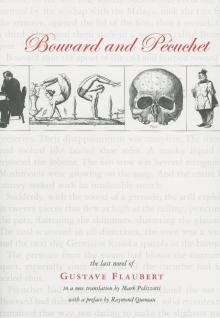 Bouvard and Pecuchet
Bouvard and Pecuchet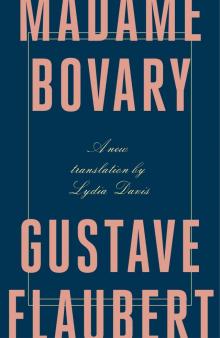 Madame Bovary
Madame Bovary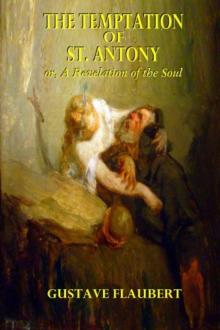 The Temptation of St. Antony
The Temptation of St. Antony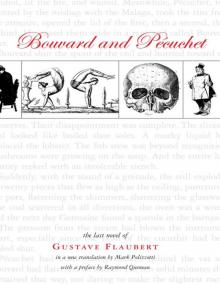 Bouvard and Pécuchet: A Tragi-comic Novel of Bourgeois Life, part 1
Bouvard and Pécuchet: A Tragi-comic Novel of Bourgeois Life, part 1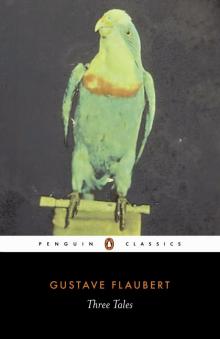 Three Tales
Three Tales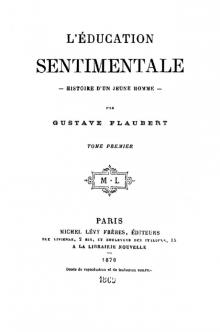 Education sentimentale. English
Education sentimentale. English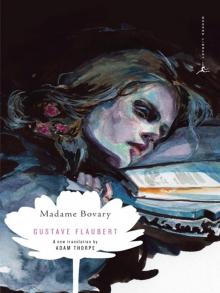 Madame Bovary (Modern Library)
Madame Bovary (Modern Library)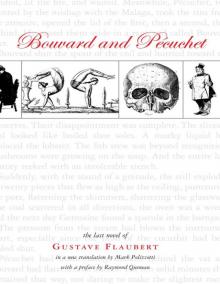 Bouvard and Pécuchet: A Tragi-comic Novel of Bourgeois Life, part 2
Bouvard and Pécuchet: A Tragi-comic Novel of Bourgeois Life, part 2 Sentimental Education; Or, The History of a Young Man. Volume 1
Sentimental Education; Or, The History of a Young Man. Volume 1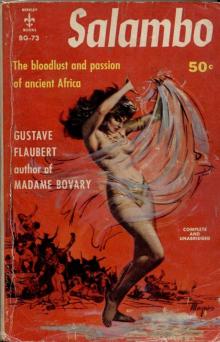 Salammbo
Salammbo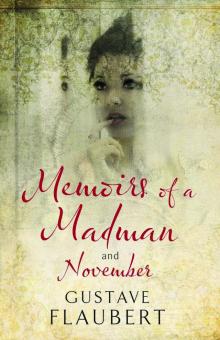 Memoirs of a Madman and November
Memoirs of a Madman and November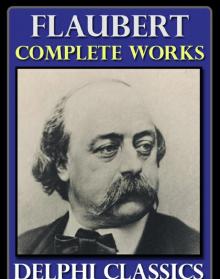 Complete Works of Gustave Flaubert
Complete Works of Gustave Flaubert